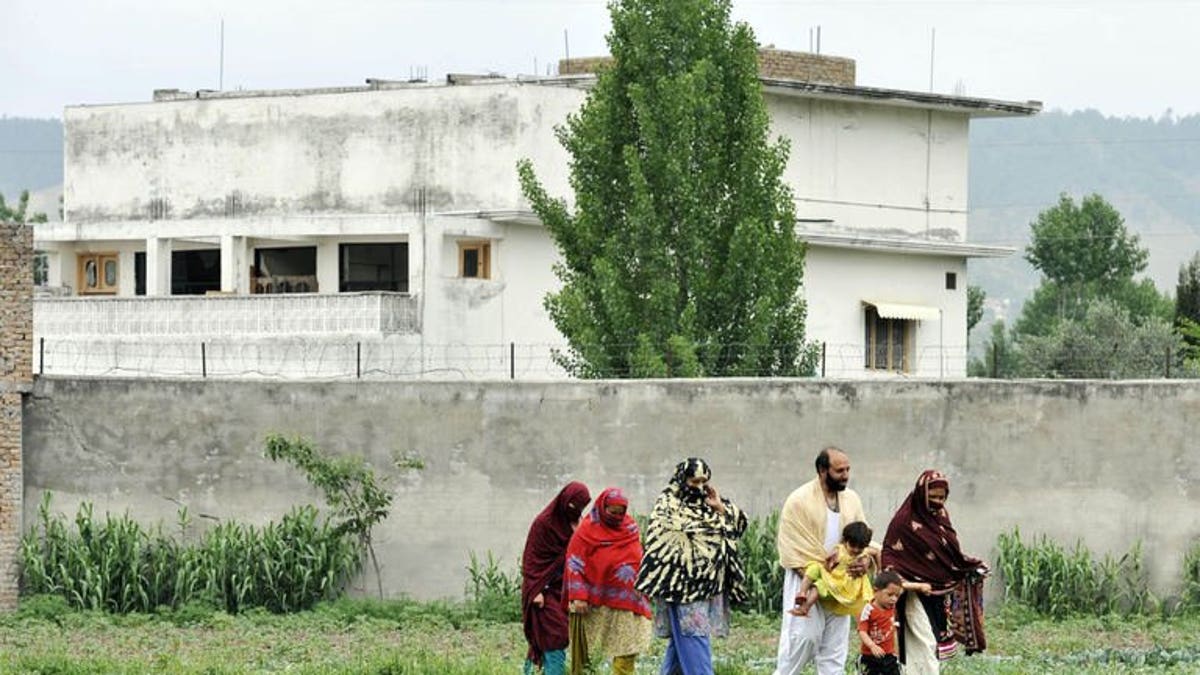
A Pakistani family leaves after visiting the hideout house of slain Al-Qaeda leader Osama bin Laden in Abbottabad on May 5, 2011. Pakistani collective failures, incompetency and negligence allowed Al-Qaeda leader Osama bin Laden to live in the country undetected for more than nine years, a leaked report has revealed Monday. (AFP/File)
ISLAMABAD (AFP) – Pakistani collective failures, incompetency and negligence allowed Al-Qaeda leader Usama bin Laden to live in the country undetected for more than nine years, a leaked report has revealed.
CIA spies tracked down bin Laden to the northwestern town of Abbottabad, where he was shot dead by US Navy SEALs on May 2, 2011 during a dramatic raid near Pakistan's military academy.
It was one of the most humiliating episodes in Pakistan's short history and exposed the country to allegations of incompetency or colluding with Al-Qaeda to hide the world's most wanted man.
The government set up a judicial commission shortly after the raid to investigate after parliament demanded an independent enquiry.
It interviewed senior civilian and military officials and bin Laden's three widows before they were deported to Saudi Arabia.
But its findings were kept secret until Al-Jazeera published them on Monday and the stinging criticism will deeply embarrass the intelligence and military authorities.
"Culpable negligence and incompetence at almost all levels of government can more or less be conclusively established by the testimonies of witnesses," the report said.
The commission said it had found nothing to support allegations of complicity but neither could it rule out the possibility of "'plausibly deniable' support" from current or former officials.
"For an institution such as the ISI (intelligence agency), negligence and incompetence are far more serious charges than possible connivance by rogue elements," it said.
The 336-page report also included some fresh details about bin Laden's day to day life after he fled the 2001 US-led invasion of Afghanistan, arriving in Pakistan in the spring or summer of 2002.
He stayed in Afghan border areas, the northwestern districts Swat and Haripur, and possibly other places before settling in Abbottabad in August 2005.
The widow of one of two Pakistanis who provided his core support network said they -- including bin Laden -- were once all stopped for speeding in Swat.
Her husband "very quickly settled the matter with the policeman and they drove on," the report said without going into detail.
But in 2005, the same year that bin Laden moved to Abbottabad, the ISI closed the file on the hunt for the Al-Qaeda supremo.
Foreign accusations that bin Laden was probably in Pakistan, were not taken seriously by the government and nor were possible military implications ever considered, it said.
In Abbottabad, testimony from his wives said bin Laden wore a cowboy hat when he moved about the compound to avoid detection.
If he felt ill, he treated himself with traditional Arab medicine and "whenever he felt sluggish he would take some chocolate with an apple," the report said.
But for nearly six years, unusual security arrangements at his villa, a lack of Internet and other abnormalities failed to attract Pakistani attention.
"How the entire neighbourhood, local officials, police and security and intelligence officials all missed the size, the strange shape, the barbed wire, the lack of cars and visitors etc over a period of nearly six years beggars belief," the report said.
Had leads or abnormalities been followed up professionally the report cautioned, it might have led to a different outcome than the US raid that violated Pakistan sovereignty, it said.
While there were never fewer than 25 people living in the compound, it was listed on a housing survey as uninhabited, a level of incompetence the report described as "astounding".
It also reserved strong language for the US raid and said the Pakistani military should have responded much more quickly to a three-hour operation, 100 miles inside its territory.
It called the raid an "American act of war" and Pakistan's "greatest humiliation" since East Pakistan seceded in 1971.
